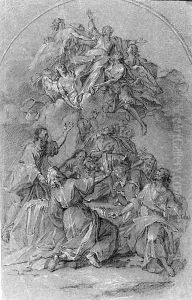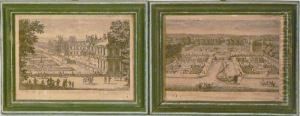Nicolas De Poilly Paintings
Nicolas de Poilly was a French engraver born in 1627 in Abbeville, France. He hailed from a family deeply entrenched in the art of engraving, which set the path for his future career. Moving to Paris, he became an integral part of the city's vibrant artistic community, contributing significantly to the engraving scene of the 17th century. De Poilly's work is notable for its precision and elegance, embodying the classical French style that was prevalent during his time. His engravings often depicted religious, historical, and mythological scenes, showcasing not only his technical skill but also his ability to convey complex narratives through imagery. De Poilly's portfolio includes collaborations with several prominent artists of his era, translating their paintings into engravings that could be disseminated more widely than the original works. This practice was crucial in spreading the aesthetic and thematic ideals of the French Baroque period beyond the confines of Paris and the court. Nicolas de Poilly's legacy is also tied to his family, with several of his descendants and relatives continuing the engraving tradition. His brother, François de Poilly the Elder, was also a celebrated engraver, suggesting that their shared upbringing played a significant role in their artistic development. Nicolas de Poilly passed away in 1696 in Paris, leaving behind a body of work that continues to be studied and admired for its craftsmanship and historical value. Through his engravings, de Poilly contributed to the broader dissemination of French art and culture, making him a significant figure in the history of French engraving.

